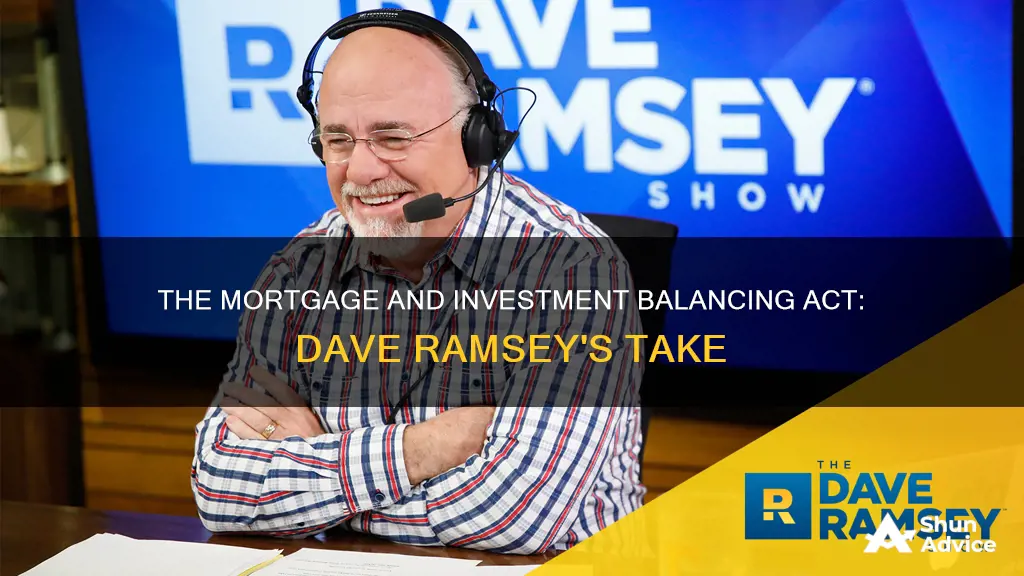
Financial guru Dave Ramsey is a proponent of paying off your mortgage early, but only under specific financial circumstances. Ramsey recommends that you first pay off all your consumer debt, build an emergency fund worth 3–6 months of your typical expenses, begin investing 15% of your income for retirement, and start putting money aside for your children's college fund. Only then should you consider paying off your mortgage early. Ramsey suggests making extra house payments, making extra room in your budget, refinancing to a lower interest rate or shorter-term loan, and putting extra income toward your mortgage. While paying off your mortgage early can provide financial freedom and peace of mind, it's important to prioritize other financial goals and consult with a qualified financial advisor to determine the most suitable strategy for your specific needs and objectives.
| Characteristics | Values |
|---|---|
| General advice | Paying off your mortgage early can save you money and years of payments. |
| However, it is not always the best financial decision. | |
| When to pay off your mortgage early | If you can answer "yes" to the following questions: "Am I free of debt with three to six months of living expenses saved?", "Can I make a 10% to 20% down payment?", "Will I be able to pay the closing costs and moving expenses with cash?", "Is the house payment no more than 25% of my net salary?", "Can I afford to choose a 15-year, fixed-rate mortgage?" and "Can I afford to pay the utility and maintenance costs as long as I own the home?" |
| When not to pay off your mortgage early | If you don't have enough savings to cover unexpected costs, such as job loss, stock market dips or a medical emergency. |
| Benefits of paying off your mortgage early | Provides stability and peace of mind, especially during retirement. |
| Frees up your budget, giving you more flexibility and freedom. | |
| Allows you to benefit from compound interest by investing the money you would have spent on mortgage payments. | |
| Drawbacks of paying off your mortgage early | Opportunity cost – you may miss out on higher-return opportunities in the market. |
| Tips for paying off your mortgage early | Make extra house payments. |
| Make extra room in your budget, e.g. by cutting back on groceries, eating out, subscriptions and online shopping. | |
| Refinance your loan for a lower interest rate or shorter term. | |
| Put extra income towards your mortgage, e.g. from raises, promotions or bonuses. |
What You'll Learn

Paying off mortgage early vs increasing investment amount
Dave Ramsey's Tips for Paying Off Your Mortgage Early
Dave Ramsey, the financial guru, has long been a proponent of financial discipline and money management. He recommends paying off your mortgage early, but only under specific financial circumstances. Here are some of his tips:
- Make an extra house payment each quarter to reduce the principal balance faster.
- Refinance your mortgage to a 15-year fixed-rate mortgage to pay it off sooner and save on interest.
- Maximize your down payment to reduce the amount you need to finance.
- Establish an emergency fund and pay off any other debts before focusing on your mortgage.
- Consider using investments, excluding retirement accounts, to help pay off your mortgage faster.
- Create room in your budget by eliminating non-essential expenses.
Arguments for Paying Off Mortgage Early
- Freedom and peace of mind: Being completely debt-free and living in a paid-for house can bring a sense of stability and freedom.
- Building wealth: Getting rid of your mortgage payment leaves you with extra money each month to save for retirement or other financial goals.
- Lower interest rates: By paying off your mortgage early, you may be able to take advantage of lower interest rates and save money.
- Tax benefits: In some cases, mortgage interest may be tax-deductible, which can impact your overall financial picture.
- Risk diversification: By not putting all your funds into home equity, you spread risk and create a more resilient financial foundation.
Arguments for Increasing Investment Amount
- Compound interest: Investing in vehicles that offer higher returns over time, such as mutual funds or retirement accounts, can potentially earn you more money than paying off your mortgage early.
- Liquidity and flexibility: By not tying up a significant portion of your wealth in home equity, you have more liquidity to handle emergencies, take advantage of investment opportunities, or pursue other financial goals.
- Opportunity cost: By focusing solely on paying off your mortgage early, you may miss out on higher-return opportunities in the market.
- Building wealth: Increasing your investment amount can potentially lead to higher returns and faster wealth accumulation.
- Lower risk: Investing in a diverse portfolio of assets can potentially reduce your overall risk compared to tying up a large portion of your wealth in a single asset, such as your home.
Both paying off your mortgage early and increasing your investment amount have their advantages and disadvantages. The best approach may depend on your financial circumstances, risk tolerance, and long-term financial goals. Consulting with a qualified financial advisor can help you make informed decisions that are tailored to your specific needs and objectives.
Safe Havens: Where to Invest Now
You may want to see also

Pros and cons of paying extra on monthly mortgage payments
Personal finance expert Dave Ramsey is a proponent of paying off your mortgage early, but only under specific financial circumstances. There are pros and cons to paying extra on your monthly mortgage payments, and it's not always the best financial decision. Here are some of the key points to consider:
Pros:
- Reduced Interest Payments: Paying extra on your mortgage can help reduce the amount of interest paid over time. Since interest is calculated as a percentage of the principal, lowering the principal balance will result in lower interest charges.
- Shorter Loan Term: Making extra payments can also shorten the term of your loan, meaning you'll be debt-free sooner.
- Building Equity Faster: By paying down the principal faster, you build home equity at a quicker pace. This can provide advantages such as taking out a home equity loan or increasing your proceeds when selling your home.
- Reduced PMI: With faster equity buildup, you may be able to reach 20% equity and cancel your private mortgage insurance (PMI) payments earlier.
Cons:
- Opportunity Cost: By prioritising extra mortgage payments, you may miss out on higher-return opportunities in the market or other investments.
- Liquidity and Flexibility: Tying up a significant portion of your wealth in home equity can reduce your liquidity and financial flexibility. In case of emergencies or unexpected expenses, you may prefer to have more readily accessible funds.
- Other Financial Goals: Extra mortgage payments may delay or hinder your progress towards other financial goals, such as saving for retirement, investing, or funding a child's college education.
- Prepayment Penalties: Some mortgages carry prepayment penalties, so be sure to check your mortgage agreement before making large extra payments.
- Cash Flow: Extra payments may impact your monthly cash flow and leave you with less money for other necessities or savings.
Ultimately, the decision to pay extra on your monthly mortgage payments depends on your individual financial circumstances, risk tolerance, and financial goals. Consulting with a qualified financial advisor can help you make an informed decision that aligns with your specific needs and objectives.
Investments to Buy: Current Opportunities
You may want to see also

Dave Ramsey's tips for paying off mortgage early
Dave Ramsey is a renowned financial guru and author who has long been a proponent of financial discipline and money management. He recommends paying off your mortgage early but only under specific financial circumstances. Here are some of his tips for paying off your mortgage early:
- Make extra house payments: Making extra payments on your mortgage can help you reduce the principal balance and shorten the term of your mortgage. For example, if you have a $240,000 30-year mortgage with a 7% interest rate, making an extra payment each quarter can help you save $184,000 in interest and pay off your mortgage 15 years early.
- Refinance your mortgage: Refinancing your mortgage to a loan with a lower interest rate or a shorter term, such as a 15-year fixed-rate mortgage, can help you save money and pay off your mortgage faster. For instance, if you have a 30-year $240,000 mortgage at 7% interest, switching to a 15-year mortgage at 6.5% interest can save you nearly $200,000 in interest and cut the payoff time in half.
- Create room in your budget: Look for areas in your budget where you can cut back on expenses and free up money to put towards your mortgage. This may include reducing your grocery budget, cooking at home instead of eating out, cancelling subscriptions, or cutting back on online shopping.
- Pay off other debts first: Before focusing on paying off your mortgage early, Ramsey suggests paying off all your other consumer debt, such as credit cards, car loans, and student loans.
- Build an emergency fund: Ramsey recommends having an emergency fund worth 3-6 months of your typical expenses before you start making extra payments on your mortgage. This will give you a cushion in case of unexpected financial shocks, such as job loss or medical emergencies.
- Start investing for retirement: Ramsey suggests investing 15% of your income for retirement before putting extra money towards your mortgage. Compound interest on investments can help you build wealth over time, and the earlier you start, the more time your money has to grow.
- Consider downsizing your home: If you're determined to pay off your mortgage faster, consider downsizing to a smaller, less expensive home. This can help reduce your debt and lower your monthly payments, allowing you to accelerate paying off your mortgage.
- Put extra income towards your mortgage: When you get a raise, promotion, or bonus, resist the temptation to increase your spending. Instead, use that extra income to make larger payments on your mortgage.
Alchemy Pay: Is This the Future of Crypto Payments?
You may want to see also

How to pay off mortgage faster
Financial guru Dave Ramsey has long been an advocate of paying off your mortgage early, but he stresses that it is dependent on your individual financial circumstances. While paying off your mortgage early can save you money in the long run, it is important to consider your current financial situation and future goals.
- Refinance your mortgage: If interest rates decline, you may be able to reduce the amount of interest you pay by refinancing your mortgage and opting for a shorter loan term.
- Make extra mortgage payments: Making extra payments can help you save money on interest and reduce the term of your loan. Ensure that your lender knows that these extra payments should be applied to the principal and not the interest.
- Make one extra mortgage payment each year: This can significantly reduce the term of your loan. You can do this by paying 1/12 extra each month. For example, if your monthly payment is $900, pay $975 each month.
- Round up your mortgage payments: Rounding up to the next highest $100 amount will help reduce the term of your mortgage. For example, pay $800 instead of $743, or $900 instead of $860.
- Try the dollar-a-month plan: If your income is increasing slightly but consistently over time, you can increase your payment by $1 each month. For example, pay $900 the first month, $901 the second, and so on.
- Use unexpected income: Send any unexpected windfalls, such as bonuses, tax returns, or credit card rewards, straight to your mortgage company.
- Make extra room in your budget: Cut down on expenses such as groceries, eating out, subscriptions, and online shopping, and put the extra cash towards your mortgage.
- Downsize your home: Consider selling your larger home and using the profits to buy a smaller, less expensive house. This will reduce your debt and lower your payments.
- Put extra income towards your mortgage: Avoid the trap of lifestyle creep and treat income boosts as opportunities to save more.
Smartly Choosing Your Investment Portfolio
You may want to see also

Why investing for retirement comes first
Retirement may seem like a distant prospect, but the reality is that it's never too early to start planning for it. Here are some reasons why investing for retirement should take priority over paying off your mortgage:
Compound Interest
Compound interest is often described as the "secret sauce" for building wealth. It is a process where your money grows exponentially over time due to interest building upon itself. The earlier you start investing, the more time you give compound interest to work its magic. For example, if you invest $1,000 in a bond that earns 3% interest per year, you will have $1,030 at the end of the first year. The next year, you will earn 3% on the new total of $1,030, resulting in $30.90 of interest. This might not seem like much at first, but the power of compound interest becomes evident over a more extended period. After 39 years, your initial investment will have grown to around $3,167. However, if you wait for 40 years, your investment will be worth $3,262.04. That's an additional $95 in just one year!
Financial Flexibility
The longer you wait to save for retirement, the more you will need to set aside from your paycheck to achieve a comfortable retirement fund. For example, setting aside $100 per month is much more feasible than $1,000. Starting early allows you to take advantage of compound interest and gives you greater financial flexibility in the present. Additionally, if you have access to an employer-sponsored retirement plan, it is advisable to contribute as soon as possible. Many employers will match your contributions up to a certain percentage, so not taking advantage of this is like turning down free money for your retirement.
Access to Higher-Risk, Higher-Reward Investments
Starting your retirement investments early grants you access to a more diversified portfolio. You will have the time to explore higher-risk, higher-reward investments with the potential for significant financial gains. Enrolling in such investment opportunities can provide you with a substantial financial cushion when you retire. Early investment also increases the likelihood of your investments successfully weathering market fluctuations.
Social Security Benefits are Not a Guarantee
In the United States, the increasing longevity of an aging population, paired with decreased population growth, means that more people will rely on Social Security benefits. This will result in Social Security paying out more than what is coming into the program, negatively impacting its long-term viability. Therefore, it is crucial to recognize the uncertain future of Social Security and not solely depend on these benefits for your retirement planning.
Inflation
People who start saving for retirement earlier in their careers increase the chances of their savings keeping pace with inflation. Inflation is a constant reality, and it is essential to consider its impact on your purchasing power during retirement. By investing early and taking advantage of compound interest, you can ensure that your retirement savings grow at a rate that outpaces inflation.
Longer Life Expectancies
On average, people are living longer than before, which means you will likely need more money to retire and care for yourself when you can no longer work. As you grow older, healthcare costs will also tend to increase. With the cost of healthcare rising annually, starting your retirement savings early will help you be better prepared for these expenses.
While paying off your mortgage is an important financial goal, investing for retirement should take precedence. By following the steps outlined above, you can make informed decisions about your financial future and work towards a secure and comfortable retirement.
Shares vs. Mortgage: Where Should Your Money Go?
You may want to see also
Frequently asked questions
Paying off your mortgage early can save you money in the long run and give you peace of mind. It can also free up your income to build wealth through investing.
You may miss out on higher-return opportunities in the market. It may also not be the best option if you have other, higher-interest debts.
Dave Ramsey recommends paying off your mortgage early, but only under specific financial circumstances. He suggests that you first pay off any other debts and build an emergency fund of 3-6 months' worth of living expenses. He also recommends investing 15% of your income for retirement and saving for your children's college fund if you have kids.







